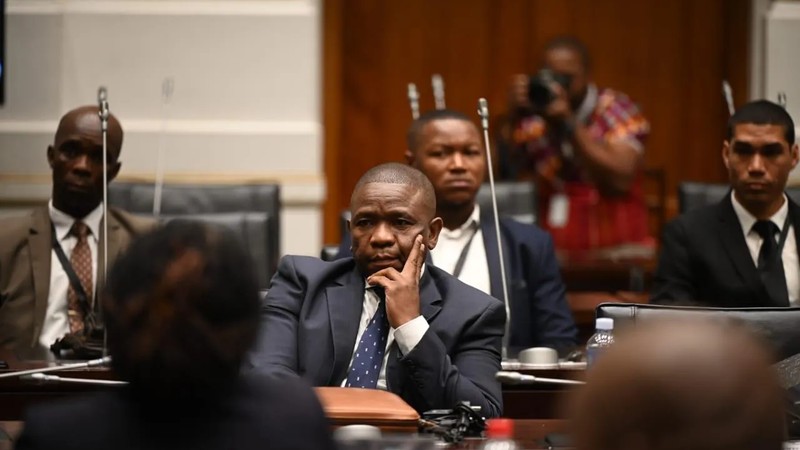
KwaZulu-Natal police commissioner, Lt-General Nhlanhla Mkhwanazi, has told Parliament that the disbanded Political Killings Task Team (PKTT) was not a political creation, but an executive response led by the security cluster following directives from President Cyril Ramaphosa.
Mkhwanazi was testifying under oath before the Ad Hoc Committee established to investigate serious allegations he made regarding political interference and the controversial shutdown of the PKTT.
He was led in his testimony by Chief Evidence Leader, Norman Arendse SC, who questioned him extensively about the formation, mandate and operations of the PKTT, which was launched in 2018 in response to rising political assassinations in KwaZulu-Natal.
Mkhwanazi said the task team was born out of an urgent intervention by Ramaphosa, who had visited Pietermaritzburg following the murder of ANC member Musawenkosi Mchunu in May 2018.
Following that visit, Ramaphosa had directed a group of ministers to meet and produce a strategy within a week to address the wave of political killings in the province.
According to Mkhwanazi, the ministers convened in Durban that same week, and the plan eventually led to the formal establishment of an Inter-Ministerial Committee (IMC), which was announced by the president in Parliament on 24 May 2018.
He explained that the SAPS, under the guidance of national leadership, was tasked with developing an operational plan. Mkhwanazi, then acting provincial commissioner in KZN, played a central role in that process.
He said he requested the deployment of Brigadier,now Lt- General, Dumisani Khumalo to the province to assist him, and, together with senior police generals, they coordinated the formation and rollout of the PKTT.
“The team was not created by politicians. It was created by the executive authority of the state, and implemented by the heads of departments, including the national commissioner,” Mkhwanazi told MPs.
He pushed back against arguments that the PKTT was a political structure, saying such a claim was “wrong,” and noted that the Minister of Police acts in terms of executive authority, not as a party-political actor.
Arendse had put it to him that some may argue that the PKTT was a temporary, politically driven initiative that could lawfully be disbanded at any time. Mkhwanazi responded that the minister of police is not acting on behalf of a political party, but as a member of Cabinet responsible for policing.
“I don’t think the legislature cares as to which political party the member belongs to. So to put a statement and say it was a political decision, what if the minister is not a politician? So I don’t think that argument will stand,” he said.
The PKTT, he said, operated at a provincial level in KZN, but was funded through a dedicated budget from SAPS national. He confirmed that although the team worked in the province, its members were drawn from across the country, bringing in expertise from various divisions.
Mkhwanazi said that while SAPS provided a specific allocation for the task team, other departments in the security cluster ,including the National Prosecuting Authority (NPA), Correctional Services, and the State Security Agency, also seconded personnel to support the multidisciplinary work, though he could not confirm whether they were given dedicated funding.
Initially, the IMC was critical of the police’s performance, demanding measurable improvements in arrests and prosecutions. Following that, SAPS developed a new plan, which was approved by the national commissioner and later presented to the ministers.
According to Mkhwanazi, the ministers were satisfied with the revised strategy, and provided ongoing oversight, often giving media briefings based on progress reports received from SAPS and the rest of the security cluster.
He said the IMC continued to function until late 2023, but had not met since the 2024 national elections, with new ministers yet to convene a follow-up.
Asked about the controversial directive issued by former Police Minister Bheki Cele on 31 December 2023, which effectively terminated the PKTT, Mkhwanazi said the instruction was lawful as it came from the executive authority. However, he maintained it was not a political act, but an administrative decision.
He emphasised that the PKTT was not a permanent structure, but had been allocated specific resources for its work. He also confirmed that the task team reported up the SAPS chain of command, from the provincial commissioner to the national commissioner, who in turn accounted to the IMC.
Politics
